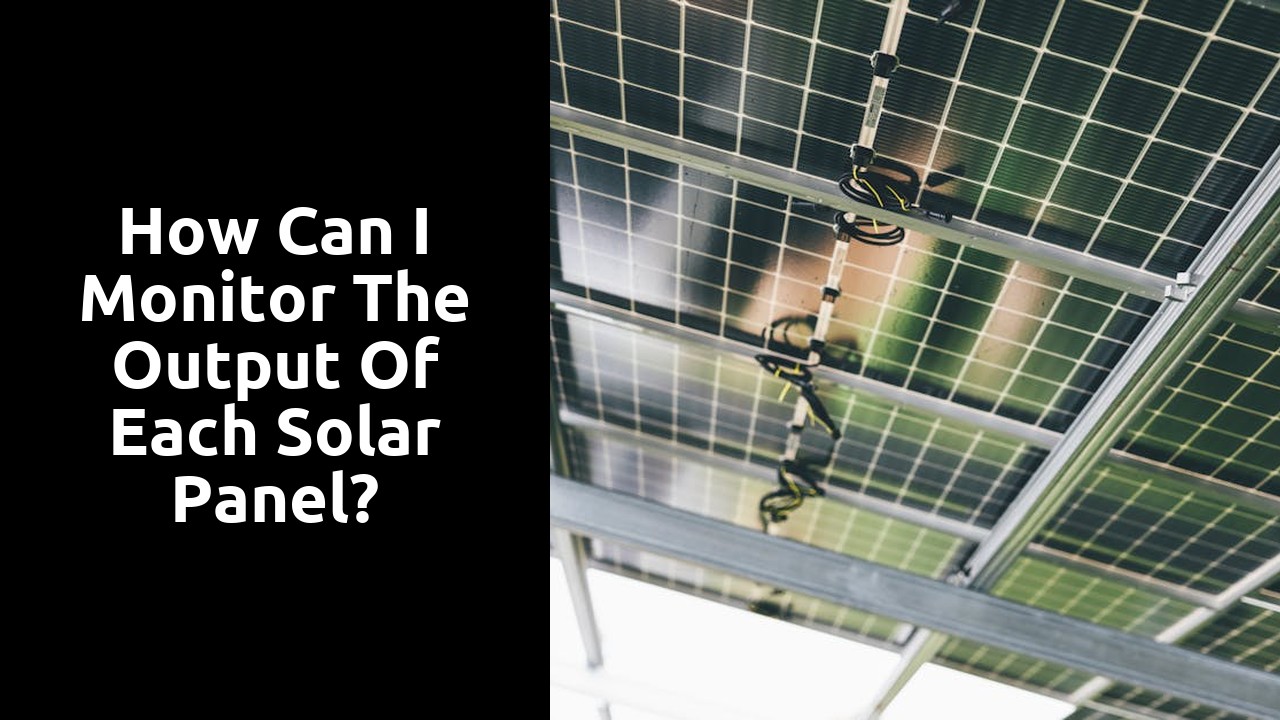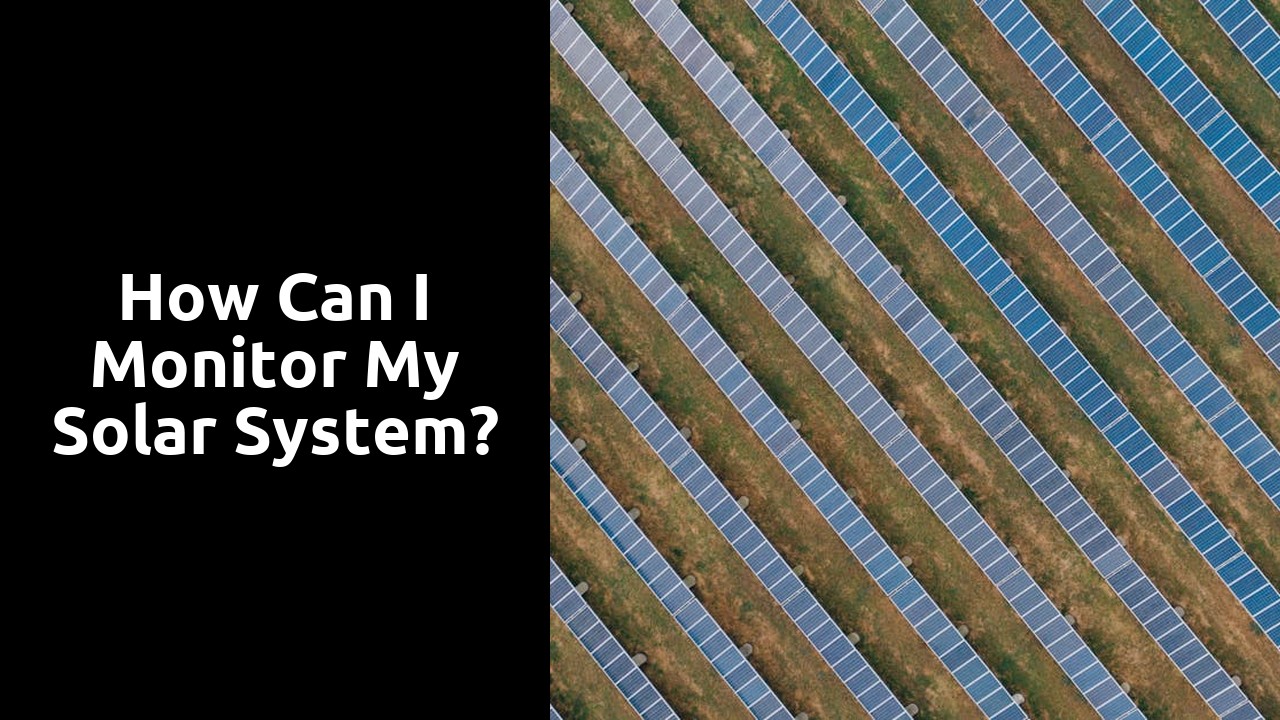
Table Of Contents
Enhancing Solar Panel Efficiency
Enhancing solar panel efficiency is crucial for maximising the energy output of your solar energy system. One effective way to achieve this is by implementing panel level monitoring. With panel level monitoring, you can track the performance of each individual solar panel in real-time. This detailed insight allows you to identify any underperforming panels quickly and take the necessary steps to address the issue. Solar panel level monitoring is usually achieved through the use of data logging devices that collect and transmit performance data to a central monitoring system.
Solar panel level monitoring can provide valuable data on the health and performance of each panel in your solar array. By monitoring the output of each solar panel, you can proactively identify any issues that may be affecting the overall efficiency of your system. This information is especially crucial when integrated with Solar Inverter System Monitoring, as it allows you to make informed decisions on maintenance and optimisation strategies. Regular performance analysis based on panel level monitoring data can help you fine-tune your system for optimal performance and energy generation.
Regular Performance Analysis
Regular performance analysis is crucial for maintaining the effectiveness of your solar panel system. By regularly monitoring the output of each solar panel, you can identify any potential issues or inefficiencies that may arise. Solar inverter system monitoring plays a key role in this process, allowing you to track the performance of individual panels and ensure that they are operating at their optimal levels.
Through consistent performance analysis, you can detect any deviations in the output of your solar panels and address them promptly. This proactive approach not only helps in maintaining the efficiency of your solar panel system but also extends the lifespan of the panels. By staying on top of regular performance analysis and utilising solar inverter system monitoring tools effectively, you can maximise the energy output of your solar panels and ultimately reap the full benefits of your investment in renewable energy.
Implementing Panel Level Monitoring
When it comes to maximising the efficiency of your solar panel system, implementing panel level monitoring is crucial. This method allows you to monitor the output of each individual solar panel in real-time, providing valuable insight into the performance of your system. With panel level monitoring, you can quickly identify any underperforming panels and address issues promptly to ensure optimal energy production.
One of the key components of panel level monitoring is the use of data logging devices. These devices are connected to each solar panel and collect data on its output, allowing you to track the performance of each panel over time. By analysing this data, you can gain a deeper understanding of how each panel is functioning and make informed decisions about maintenance and upgrades. Solar inverter system monitoring plays a pivotal role in ensuring the overall efficiency and longevity of your solar panel system.
Data Logging Devices
Data logging devices play a crucial role in tracking the output of individual solar panels within a solar array. These devices are designed to collect data on the performance of each panel and transfer this information for analysis. By using data logging devices, solar system owners can gain valuable insights into the efficiency of their panels and identify any issues affecting the overall output of the system.
Solar inverter system monitoring is significantly enhanced through the use of data logging devices. These tools help to pinpoint any underperforming panels or potential system malfunctions early on, allowing for timely maintenance and ensuring that the solar array operates at its optimal capacity. With the detailed information provided by data logging devices, users can make informed decisions to improve the overall performance of their solar power system.
Strategies for Optimising Solar Panel Performance
To enhance the performance of your solar panels, it is imperative to implement strategies that optimize their output. One effective method is to invest in Solar Inverter System Monitoring. This technology allows you to track the performance of each solar panel individually, enabling you to identify any inefficiencies promptly. By closely monitoring the output of each panel, you can take proactive measures to address any issues and maximize the overall efficiency of your solar power system.
Additionally, regularly cleaning and maintaining your solar panels is crucial for optimal performance. Dust, dirt, and debris can accumulate on the surface of the panels, reducing their efficiency. By conducting routine cleaning and maintenance checks, you can ensure that your panels are operating at their full capacity. This simple yet effective practice can significantly enhance the overall performance of your solar panel system, leading to increased energy production and cost savings in the long run.
Realtime Monitoring Applications
Real-time monitoring applications play a crucial role in maximizing the efficiency of solar panel systems. By employing advanced monitoring systems, individuals can gain valuable insights into the output of each solar panel. One effective method for achieving this level of monitoring is through the use of Solar Inverter System Monitoring, which allows users to track the performance of individual panels with precision.
These real-time monitoring applications enable users to detect any potential issues or discrepancies in performance promptly. By closely monitoring the output of each solar panel, individuals can make informed decisions to optimize the overall efficiency of their solar panel system. Solar Inverter System Monitoring is a powerful tool that empowers users to assess the performance of their panels accurately and make necessary adjustments to achieve peak efficiency.
FAQS
How can I monitor the output of each solar panel?
You can monitor the output of each solar panel by implementing panel level monitoring solutions.
What are the benefits of monitoring the output of each solar panel?
Monitoring the output of each solar panel allows you to identify underperforming panels, optimize the system's overall efficiency, and maximize energy production.
Can I monitor the output of each solar panel in real-time?
Yes, you can monitor the output of each solar panel in real-time using data logging devices and real-time monitoring applications.
How often should I perform performance analysis on my solar panels?
It is recommended to perform regular performance analysis on your solar panels at least quarterly to ensure optimal efficiency and output.
What are some strategies for optimizing solar panel performance?
Some strategies for optimizing solar panel performance include regular maintenance, cleaning, shading analysis, and monitoring the output of each individual panel for any discrepancies.
